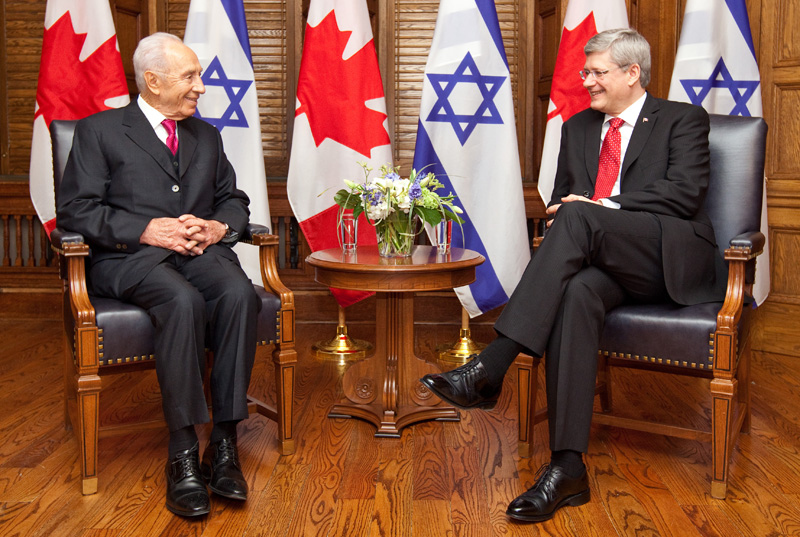Israel is an immensely complicated country, and it takes a great deal of time for an outsider to begin grasping its many facets. So when you just pop in for four days for your first-ever visit, as Prime Minister Harper is about to do, your itinerary is critical. Mr. Harper and his team will return confident that they now have a good grasp of Israeli realities. They will be deluded. All they will see is one particular dimension of Israeli reality, the one their Israeli government hosts want them to see and which, as it happens, is also the one they want to see. The entire West Bank and Gaza are to receive a hasty meeting in Ramallah with Palestinian President Mahmoud Abbas. Why complicate the Prime Minister’s simple one-dimensional view of Israel by exposing him to the larger picture?
The real purpose of the trip, of course, is to help Mr. Harper become an even more unconditional advocate for Israel, although that seems quite impossible. But it’s not Israel that he supports. It’s the government of Benjamin Netanyahu. Among the great truths the Canadian delegation will not be reminded of is that Mr. Netanyahu represents only one faction of Israel today, just as Mr. Harper represents only a minority of Canadians.
Countless visitors to Israel return kidding themselves they now know the country. Much of this is carefully organized. Birthright Israel, for example, sponsors free, all-expenses paid 10-day trips to Israel for Jewish young adults aged 18-26. The purpose is quite straightforward. As one board member put it, participants are expected to return home “ready and eager to be advocates for Israel.” Since the program began in 1999, a remarkable 350,000 young people from 64 countries have participated, about 80 per cent of them from the United States and Canada.
The young men and women of Birthright see exactly what the Israeli government wants them to see. That means they get to meet exactly none of the many Israelis who disagree passionately with their government and get to see little or nothing of the Palestinians. It appears the same will be largely true this week for Mr. Harper and his entourage.
Mr. Harper’s carefully limited itinerary will not, however, constrain him or his colleagues from returning as experts on all things Israeli — Israel’s secret cache of nuclear weapons, the menace of Iran, the treatment of Israeli Arabs, Israel as an occupying power, the wickedness of labeling Israel an apartheid state, conditions in Gaza and the West Bank, the refugee camps, Palestinian responsibility for failed peace talks, the Israeli-controlled checkpoints for Palestinians, the special roads for Israeli use only, Israeli settlers’ treatment of Palestinians and so many other matters about which they will return with no more personal knowledge than they began.
Never having seen it for themselves — although it’s the easiest thing in the world to do — Mr. Harper and crew will not see how Israeli soldiers at many West Bank checkpoints casually humiliate and torment Palestinians way beyond any legitimate Israeli security needs. Instead, they will join the Netanyahu chorus and dismiss anyone who makes this point, or criticizes virtually any Israeli government policy regarding the Palestinians, as anti-Semitic. The Holocaust is routinely invoked.
I wonder if any of Mr. Harper’s fellow travellers, including the accompanying journalists, might be interested in branching out a bit for themselves. There is, after all, a veritable cornucopia for them to experience. For just one example, the Israeli group Breaking the Silence, founded by disillusioned Israeli Defense Forces soldiers and veterans, collects testimonies from IDF soldiers who can no longer remain silent about the brutal treatment they’ve witnessed by Israelis of Palestinians. About 900 from all ranks have spoken out. Wouldn’t it be vaguely interesting to talk to them?
Breaking the Silence also arranges tours to places that Birthright or the Centre for Israel and Jewish Affairs, the official advocacy arm of the Canadian Jewish establishment, would never dream of sending visitors. One is to the small Palestinian city of Hebron, just south of Jerusalem, where fewer than a thousand Israeli extremists, protected by the might of the Israeli army, have been allowed to make life a misery for the city’s 170,000 Palestinians. Hebron is a shameful development that needs to be seen to be believed, and even then it’s barely believable.
But there’s so much else that shouldn’t be missed either. Why not try to meet the past leaders of Shin Bet, Israeli’s renowned anti-terrorist intelligence and security agency, who have publicly and unanimously asserted that it is not the Palestinians but the illegal West Bank settlements that are the major impediment to forging a secure future for Israel?
So much to do, so little time. So why spend it — and all those public funds — just to have your existing biases confirmed?
Image flickr/pmwebphotos



